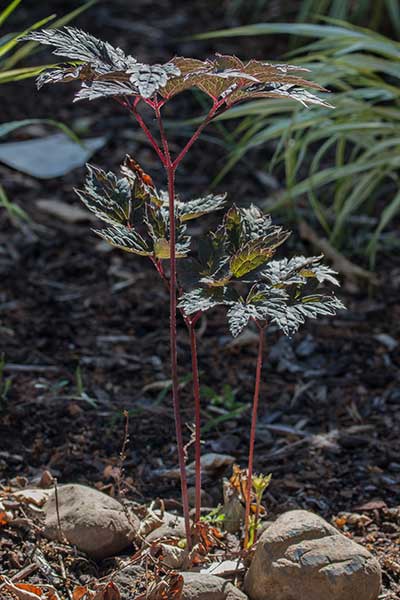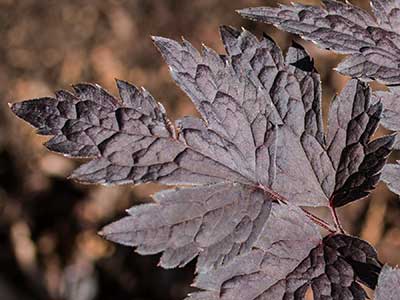Bugbane 'Hillside Black Beauty'
- Scientific Name: Actaea simplex 'Hillside Black Beauty'
- Garden: Dog Friendly Garden
- Plant Type: Herbaceous Perennial
- Evergreen/Deciduous: Deciduous
- Sun/Shade Exposure: Part Sun to Part Shade
- Moisture Requirements: Moist, well-drained
Plant Information
Native only to British Columbia south through western Oregon, it is considered rare and endangered in the wild; not because it isn’t commonly found (which is the usual indicator, sizable communities but in only a few locations), but because the number of individual plants in the many places it can be found is very small, sometimes less than twenty-five in number. It has only been through careful propagation that they are now available for sale.
Planting this woodland beauty in your garden, then, is an act of helping to restore and repopulate this important native plant. It is attractive as both a pollen and food source to more than one species of butterfly and attracts bees and other beneficial insects.
Its common name of Bugbane comes from both its attribute of being virtually pest-free, as well as useful as a bug-repellent.
It is important to note however, that while not toxic to birds, the seeds (and possibly all parts of this plant) are highly toxic to mammals, including humans.
Culture: Plant in part sun to part shade. At the coast or in cooler regions, it can be planted in full sun. In Portland, protection from the hottest sun of the day, or supplemental water is important to prevent leaf scorch.
Full shade will result in plants that reach for light or fall over, greener leaves (as opposed to the desired purple) and sparse flowers.
Actaeas prefer rich, deep soil where water doesn’t pool in winter with supplemental water in the dry months. Hardy in zones 4-9.
Maintenance: Easy care! Water deeply about once a week in dry weather and cut back in fall when leaves brown.
Additional qualities: Attracts butterflies and other pollinators. Deer resistant. Cut flowers and attractive seed pods. Tolerates moist soil. Fragrant flowers.
Pest and Disease: Actaeas are generally easy to keep free of pests and diseases; apply Sluggo Plus to prevent cutworms in the fall and spring if leaves have been eaten in the past. Root rot is a possibility in poorly drained soils, if planting in a boggy spot, consider amending the soil with pumice at planting time.
Data Source
http://www.portlandnursery.comPlant Photos





